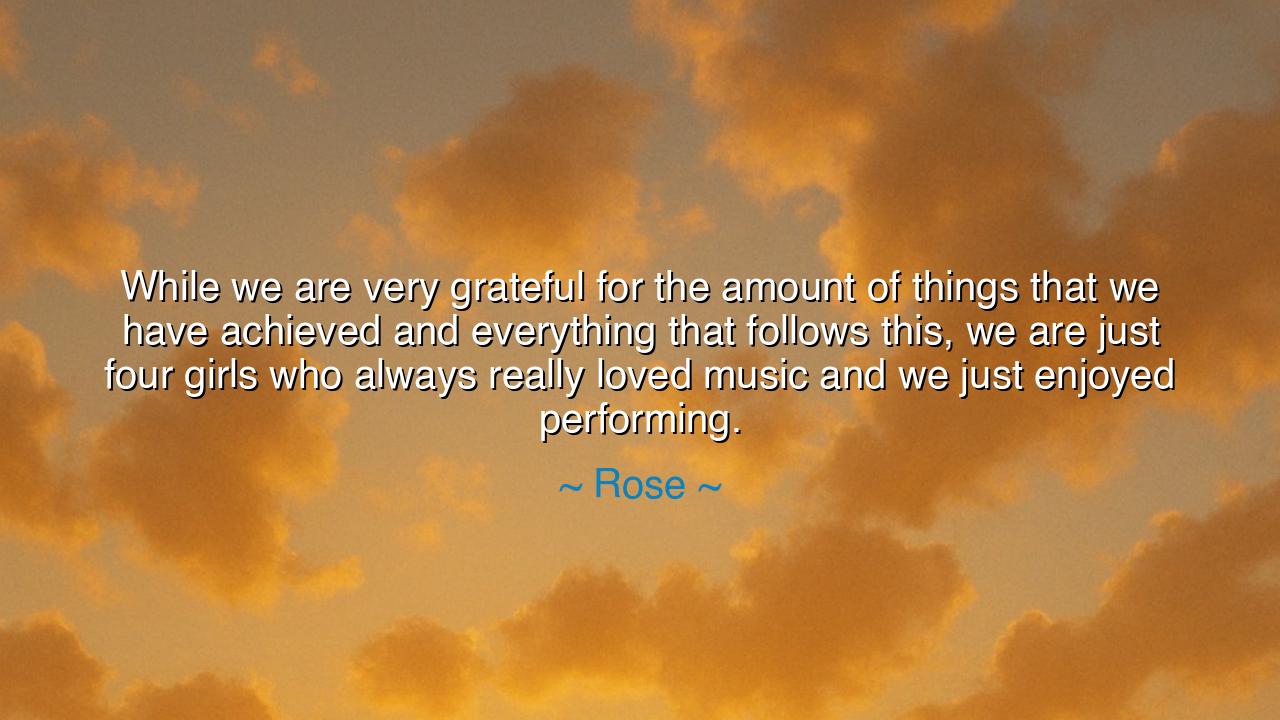
While we are very grateful for the amount of things that we have
While we are very grateful for the amount of things that we have achieved and everything that follows this, we are just four girls who always really loved music and we just enjoyed performing.






When Rosé declared, “While we are very grateful for the amount of things that we have achieved and everything that follows this, we are just four girls who always really loved music and we just enjoyed performing,” she spoke not only for herself and her companions, but for every soul who has tasted triumph and yet remembers the purity of beginnings. Her words remind us that beneath the crowns of fame, beneath the applause and the honors, the heart of true artistry is love—love of music, love of creation, love of the act itself.
The ancients would have called this humility the anchor of greatness. For the poet who forgets why he first sang, the warrior who forgets why he first fought, or the leader who forgets why he first served, soon finds his glory hollow. Rosé’s words echo a timeless wisdom: though the world may heap upon you titles and wealth, never lose sight of the simple joy that called you in the first place. To remember this is to remain rooted, unshaken by the storms of fame.
Her confession speaks of gratitude as well. She acknowledges the victories achieved—the records, the stages, the adoration—but she does not let these become the center of her soul. Instead, she points to the foundation: “we are just four girls.” Here lies the power of simplicity. Greatness does not arise from thinking oneself a god, but from remembering that one is still human, still a child of humble beginnings, still one who once played for the love of playing. This balance of gratitude and humility is the true mark of wisdom.
History offers us a mirror in the tale of Marcus Aurelius, emperor of Rome and master of an empire. Though he held the power of legions, he constantly reminded himself in his writings: “Remember you are but a man.” He cherished philosophy not for the applause of scholars, but for the guidance of his own soul. In the same way, Rosé reveals that even at the height of achievement, one must remember the core—here, the pure joy of making music with friends.
There is also a lesson in the collective nature of her words. She does not say “I,” but “we.” She honors the unity of the four, bound together not by contracts or circumstance, but by shared love of performing. The ancients revered such fellowship: the Spartans who fought side by side, the disciples who walked with their teacher, the artisans who built temples stone by stone. It is this spirit of shared devotion that multiplies strength and sustains endurance.
For us, the teaching is clear: never let your achievements blind you to your origins. Whatever stage you stand on, remember the room where you first practiced, the laughter of companions, the fire that burned before anyone knew your name. Let gratitude guide you, let humility steady you, and let joy be the compass that never wavers. In this way, your labor will remain pure, and your success will not enslave you but free you.
Practically, this means returning often to the source. If you are an artist, play not only for the crowd but for the simple joy of the craft. If you are a worker, remember the pride of learning your skill, not just the paycheck it brings. If you are a leader, return to the purpose of service, not merely the glory of power. By doing this, you keep your heart alive and your spirit unbroken.
Thus, Rosé’s words shine as a reminder for all generations: success is a blessing, but it is not the root. The root is love—for the craft, for the companions, for the act itself. Hold to this, and whether the world crowns you or forgets you, you will live fully, joyfully, and true. For the greatest achievement is not the applause of millions, but the ability to still love what you loved at the beginning.






AAdministratorAdministrator
Welcome, honored guests. Please leave a comment, we will respond soon